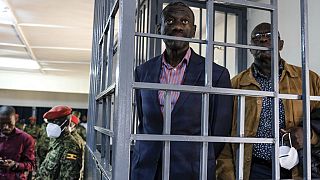Uganda
Ivan Bafaki spends most of his days looking online, searching for work opportunities outside his native Uganda.
Bafaki is among thousands of registered nurses in Uganda who've not entered the country's health workforce.
Uganda produces about 5,000 nurses every year. And of these, only about 2,000 are employed in government hospitals.
“The situation here is too bad, you can’t make it," says 26-year-old Bafaki.
"A few of the nurses can make it here, very many nurses like me, it's a hustle for them to make it here.”
Uganda Nurses and Midwives Union president Justus Cherop says the country has a surplus of nurses.
“The government cannot recruit all of them. We needed like 40,000 nurses in our health sector, but because of the wage bill, the government (has) less money, so our nurses are overworked in this sector," he says.
"So, we are looking at the welfare of a nurse who has trained and remains at home, you have a degree, but you are not employed anywhere, because of the wage bill.”
Uganda's Health Minister Dr. Jane Ruth Aceng says policies are being put in place to ensure nurses and other health professionals are brought into the health sector.
But, despite shortfalls in staffing, they cannot stop health professionals going to find work abroad.
“It is true that African countries have lost many of their workforces, especially health to other countries, for many reasons," she says.
"African countries have not yet reached the World Health Organization's recommendations for the number of health workforce per-population. I think in Uganda we are as low as 2 per 10,000 doctors per-population, still we cannot stop them from migrating.”
But as the country struggles with surging numbers of unemployed health professionals, many other countries are now calling for their services.
Registered nurse Gladys Nakiguli left Uganda for the UK in 2019 after a tip from a friend.
Nakiguli says before the move, she even contemplated retiring from the nursing profession.
“I wasn’t even seeing myself even being a nurse for up to 7 years, so I was on a journey to retirement, doing something entirely different," she says.
"When I got the information, I did a Google search, I tried to find information, and on getting it, I was like, oh, so this is doable."
Despite the challenges in Uganda, many students continue to enroll at nursing schools.
There's a full classroom here at Mulago Training School For Nurses and Midwives in the capital, Kampala.
School principal Eva Nampiima says they have no plans to slow recruitment because their own country needs them.
"We train a good number of nurses because it gives us opportunity for our nation to have what it can consume at the same time also to export them to other countries who might be in need of them," she says.
Some students here can't wait to leave school and start using their newfound knowledge.
“Nursing is a call. You are chosen by God to love and serve, so our work is even done in community," says nursing student Charity Chebet.
Others, like student Cathy Busingye, are already making plans to move abroad and apply their skills elsewhere.
“I hear that Canada wants like more nurses. So, I also have that plan that after I can go and work there because they like them. If it fails in Uganda, then you plan elsewhere," she says.
The loss of nurses overseas is raising concerns that the number of medical workers in the country will grow too small to provide care for an increasing number of patients.
Justus Cherop says demand for Ugandan nurses has doubled in recent years.
"We have the UK, who badly need nurses, we have America, who badly needs nurses, recently I was in Canada for one week, the nurses are needed there. I was also in Italy, the nurses are needed there. So, we need the government to flex the movement of nurses abroad," he says.











11:05
Africa's hight cost of climate change [Business Africa]
01:16
Kenya investigates alleged abduction in Nairobi of Uganda opposition figure
01:16
Ugandan opposition politician kidnapped and jailed, his wife says
01:28
Dozens of health workers on trial in Turkey accused of causing infant deaths
01:25
WHO says almost a million mpox vaccines have been allocated to Africa
02:19
Thousands of refugees in Uganda struggle to get by, amid cuts in humanitarian aid